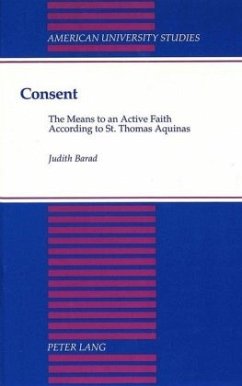In this book, Judith Barad offers a fresh treatment of St. Thomas Aquinas' account of faith by emphasizing his distinction between assent and consent. The distinction entails that although intellectual assent is a necessary condition of faith, the consent of the will, issuing in moral activity, is required for faith's completion. Through her analysis of Aquinas' distinction, Barad maintains not only that the traditional characterization of Aquinas as an intellectualist in matters of faith is false, but that Aquinas can shed light on the difference between religious hypocrisy and devotion.
"Dr. Barad's closely reasoned analysis of Aquinas' position on faith breaks new ground, clearly identifying moral activity as a requirement for the completion of faith. This work is important for both philosophers and theologians. The distinction between assent and consent has been too long overlooked in studies of Aquinas' discussion of faith. Dr. Barad's work is a must for all modern Thomists." (Eugene de V. Lockwood, Oakton Community College)
"Barad's book makes an original contribution to an important and difficult problem within Aquinas' theology and philosophy and, more generally, within Christian and theistic philosophy. It raises (and answers) such questions as what is faith? How is faith related to knowledge? How is faith related to moral activity? Which has primacy, the intellect or the will? Barad's answer is to distinguish between assent (which is mainly intellectual and prior) and consent (which is volitional and posterior). She convincingly and clearly grounds this distinction on impressive textual evidence - both on the texts of Aquinas himself (with refernces to Aristotle, Augustine and John Damascene) and of relevant secondary literature. Her book is valuable to scholars, graduate students and libraries." (Leo Sweeney, S.J. Loyola University, Chicago)
"Barad's book makes an original contribution to an important and difficult problem within Aquinas' theology and philosophy and, more generally, within Christian and theistic philosophy. It raises (and answers) such questions as what is faith? How is faith related to knowledge? How is faith related to moral activity? Which has primacy, the intellect or the will? Barad's answer is to distinguish between assent (which is mainly intellectual and prior) and consent (which is volitional and posterior). She convincingly and clearly grounds this distinction on impressive textual evidence - both on the texts of Aquinas himself (with refernces to Aristotle, Augustine and John Damascene) and of relevant secondary literature. Her book is valuable to scholars, graduate students and libraries." (Leo Sweeney, S.J. Loyola University, Chicago)

